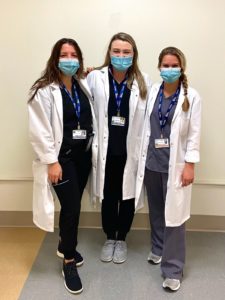Skilled nursing facility staffing in the wake of the pandemic and the great resignation has been a struggle. This is irrespective if your building is a large metropolitan facility or a small rural building. Each SNF has its unique difficulties and ways of dealing with them. The staffing shortage coupled with turnover leads to specific concerns when it comes to feeding/dining assistance.
Assisting a patient who needs help eating is both a skilled task and a highly impactful one. It is here that the nursing home speech-language pathologist becomes a team leader in ensuring patients are on the safest, yet least restrictive diet.
Eating can be one of the last social events a patient enjoys and as such requires training. Among the skills needed are understanding consistencies, specific compensatory strategies, positions, postures, portion sizes, and the person.
Speech Therapists need to remember the person & use the dining experience to engage both cognitively and linguistically. When working with a person with dementia, these natural environmental tasks allow for multiple, real-life communication events. Here are a few thoughts on how to make a better conversation with a person with dementia.
Allow Time
People with dementia need longer to process. Allow what feels like too long before repeating yourself or moving to a new topic or question.
Be An Active Listener
Make eye contact, nod, and engage in the conversation. You shouldn’t be looking at your phone anyway but DON’T LOOK AT YOUR PHONE. Repeat back pertinent words that you hear. Reflective speech is a good way to let the speaker know that they have been heard.
Keep It Simple
Refer to people and items by their names. Rather than he, she and it, this may allow the resident to stay on topic and engaged in the conversation.
If you have any questions or ideas, please feel free to contact us.
About the Author:
Michael Webb is a graduate of The College of Saint Rose in Albany, NY with his master’s degree in Communication Disorders and more recently earned his Master of Healthcare Administration from the University of Ohio.
Michael serves as an instructor in the Communication Disorders Department at SUNY New Paltz, instructing graduate students in FEES.
Additionally, He served as a member of the department chair search committee for the newly developed State University of New York at Stony Brook University Communication Disorders program and was since appointed to the position of Clinical Instructor in the School of Health Technology and Management. In the fall of 2020, Michael began instructing Stony Brook’s first group of graduate-level speech therapy students.
While Michael continues to provide clinical services and perform flexible endoscopic evaluations, his role in Language Fundamentals includes both business and program development. In addition, he ensures regulatory compliances and how they relate to the hospitals and skilled nursing facilities for which Language Fundamentals’ provides service.



